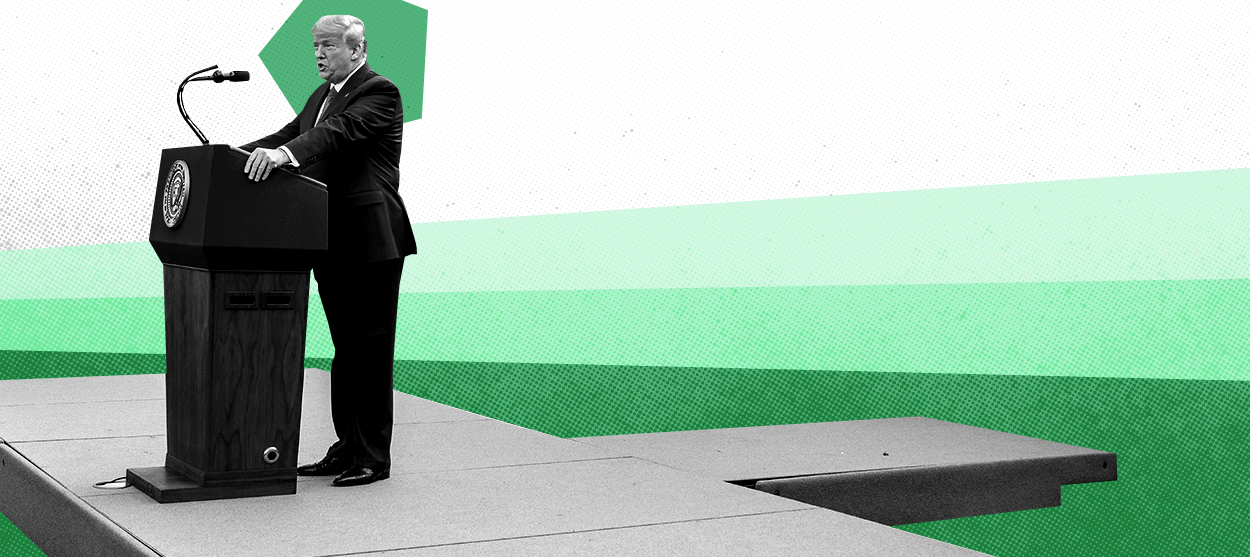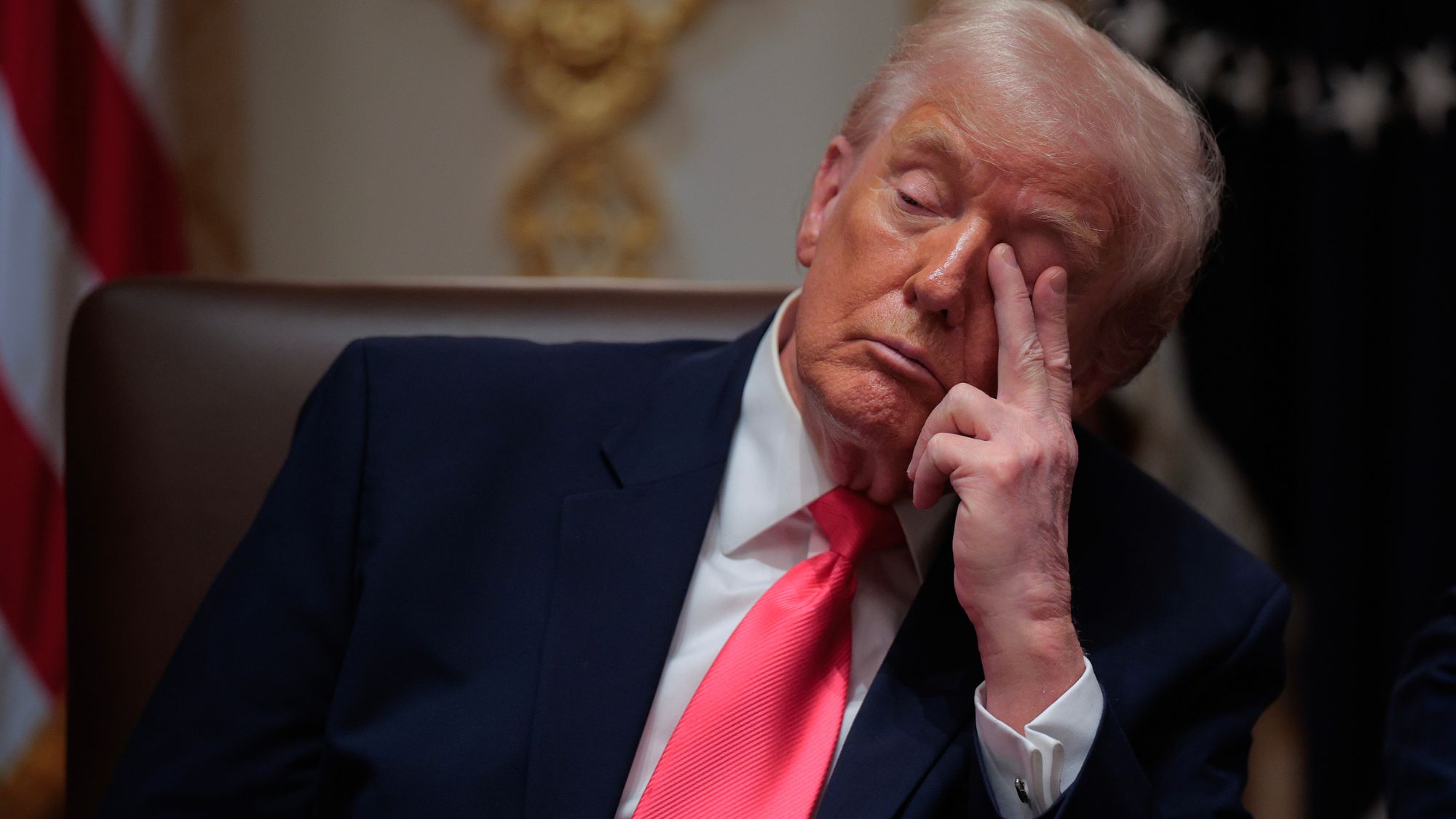Do polls show the media is missing the story on Trump?
Why Americans are warming up to the president, despite all the negative coverage


A free daily email with the biggest news stories of the day – and the best features from TheWeek.com
You are now subscribed
Your newsletter sign-up was successful
When your industry gets a lower approval rating than both President Trump and Congress, it might be a sign that it has gone astray with the American public. When it gets a lower rating than Congress', it's practically confirmation. Gallup's findings last week did just that, putting the disconnect between the tenor of the national media's coverage of Trump in the coronavirus crisis and Americans' approval of him in stark relief.
The Gallup poll asked specifically about the response of various institutions to the pandemic, not overall performance approval, in the third week of March. Hospitals, schools, employers, state governments, and the Centers for Disease Control and Prevention and National Institutes of Health all scored in the 80 percent range. Roughly 20 points below that came Vice President Mike Pence, Trump, and Congress, right around the 60 percent mark and in that order. All of the aforementioned had solidly positive ratings by 20 or more points — even Congress, an institution whose overall approval rating usually registers in the teens, if not single digits.
The only American institution to register in negative numbers for its coronavirus response was the national media. Between March 13 and 22, only 44 percent of respondents rated the national media's performance in the crisis positively. More than half — 55 percent — expressed disapproval over the media's performance. The partisan split on this question was significant: Sixty-one percent of Democrats felt positively about the media's response, while just 25 percent of Republicans approved of it.
The Week
Escape your echo chamber. Get the facts behind the news, plus analysis from multiple perspectives.

Sign up for The Week's Free Newsletters
From our morning news briefing to a weekly Good News Newsletter, get the best of The Week delivered directly to your inbox.
From our morning news briefing to a weekly Good News Newsletter, get the best of The Week delivered directly to your inbox.
The media’s negative ratings from a public are even more remarkable, coming from Americans clearly in the mood to support its national institutions in this crisis. The media's focus on itself and its existing antagonisms with Trump rather than on the urgent issues at has created a further gulf between the industry and its consumers. They failed to grasp the moment that Trump belatedly recognized, and they still have not quite come to terms with it.
At the time of the survey, Trump had only just started to change his public messaging on COVID-19. He had previously chosen to minimize the potential effects of the pandemic and his approval rating sagged even further than normal as a result. The White House then shifted its messaging to focus on the crisis as a "war," and Trump (mostly) dropped the minimizing rhetoric to speak in more stark terms about the virus.
To some extent, Trump's polling surge is at least in part a rally effect. In a crisis, voters instinctively want and need leaders to react well. However, actions taken by Trump shortly after his substantial pivot has contributed to that impulse and will matter to the endurance of his polling surge. His leadership on the historic $2.2 trillion relief bill helped bridge a partisan divide when negotiations broke down between Mitch McConnell, Chuck Schumer, and Nancy Pelosi, perhaps mostly by signaling openness to their demands for transparency and accountability on corporate assistance. Trump also made an effort to work with Democratic governors in California and New York, with Democratic Govs. Gavin Newsom and Andrew Cuomo offering praise for his efforts — at times, anyway.
Now, Americans seem to like what they're seeing from Trump. Almost every polling series, with the exception of normally friendly Rasmussen, shows Trump getting the best overall approval ratings of his presidency. The RealClearPolitics aggregate hit its highest average approval level, 47.2 percent, higher even than the 45.9 percent just after Trump's inauguration. The latest iteration of The Washington Post/ABC News series not only has Trump at the first positive approval rating of his presidency (48/46), it also shows the incumbent president building an impressive enthusiasm gap among voters for November over former Vice President Joe Biden. Fifty-five percent of Trump's supporters claim to be "very enthusiastic," almost double that among Biden supporters (28 percent).
A free daily email with the biggest news stories of the day – and the best features from TheWeek.com
Perhaps the most successful strategy deployed by the White House to communicate Trump's change of posture has been the daily presidential press conference. Trump has revived the White House press briefing tradition that he had ended due to his preference for communicating through Twitter. The upswing in his approval ratings shows the power of the bully pulpit to shape public opinion, a tool that Trump arguably neglected for too long. The press has not had this kind of daily access to a president in a very long while, perhaps as far back as the 2008-2009 financial crash or even the 2003 Iraq war.
The media's reaction to such access has been instructive. While outlets' ratings have soared, some reporters want their employers to stop covering the briefings, ostensibly because of Trump's proclivity for spreading misinformation, but also perhaps because of the briefings' effectiveness at boosting Trump's popularity; as CNN's Daniel Dale complained, they had "replace[d] campaign rallies."
That attitude might puzzle viewers who are locked in their homes and desperate to find out what's happening with the coronavirus crisis. Coming from the same media outlets that have lamented (for good reason) the end of the daily briefings during normal, non-crisis periods, these complaints sound hypocritical. Furthermore, they have a strong whiff of bias, especially when reporters spend too much time trying to interrogate Trump over his past statements rather than on what is happening at the moment.
Voters appear to be signaling that these fights are of little interest to them. Rightly or wrongly, what Americans see is the media feuding with the president while the president takes action to meaningfully address the crisis.
Edward Morrissey has been writing about politics since 2003 in his blog, Captain's Quarters, and now writes for HotAir.com. His columns have appeared in the Washington Post, the New York Post, The New York Sun, the Washington Times, and other newspapers. Morrissey has a daily Internet talk show on politics and culture at Hot Air. Since 2004, Morrissey has had a weekend talk radio show in the Minneapolis/St. Paul area and often fills in as a guest on Salem Radio Network's nationally-syndicated shows. He lives in the Twin Cities area of Minnesota with his wife, son and daughter-in-law, and his two granddaughters. Morrissey's new book, GOING RED, will be published by Crown Forum on April 5, 2016.
-
 The Olympic timekeepers keeping the Games on track
The Olympic timekeepers keeping the Games on trackUnder the Radar Swiss watchmaking giant Omega has been at the finish line of every Olympic Games for nearly 100 years
-
 Will increasing tensions with Iran boil over into war?
Will increasing tensions with Iran boil over into war?Today’s Big Question President Donald Trump has recently been threatening the country
-
 Corruption: The spy sheikh and the president
Corruption: The spy sheikh and the presidentFeature Trump is at the center of another scandal
-
 The billionaires’ wealth tax: a catastrophe for California?
The billionaires’ wealth tax: a catastrophe for California?Talking Point Peter Thiel and Larry Page preparing to change state residency
-
 Bari Weiss’ ‘60 Minutes’ scandal is about more than one report
Bari Weiss’ ‘60 Minutes’ scandal is about more than one reportIN THE SPOTLIGHT By blocking an approved segment on a controversial prison holding US deportees in El Salvador, the editor-in-chief of CBS News has become the main story
-
 Trump’s poll collapse: can he stop the slide?
Trump’s poll collapse: can he stop the slide?Talking Point President who promised to ease cost-of-living has found that US economic woes can’t be solved ‘via executive fiat’
-
 Has Zohran Mamdani shown the Democrats how to win again?
Has Zohran Mamdani shown the Democrats how to win again?Today’s Big Question New York City mayoral election touted as victory for left-wing populists but moderate centrist wins elsewhere present more complex path for Democratic Party
-
 Millions turn out for anti-Trump ‘No Kings’ rallies
Millions turn out for anti-Trump ‘No Kings’ ralliesSpeed Read An estimated 7 million people participated, 2 million more than at the first ‘No Kings’ protest in June
-
 Ghislaine Maxwell: angling for a Trump pardon
Ghislaine Maxwell: angling for a Trump pardonTalking Point Convicted sex trafficker's testimony could shed new light on president's links to Jeffrey Epstein
-
 The last words and final moments of 40 presidents
The last words and final moments of 40 presidentsThe Explainer Some are eloquent quotes worthy of the holders of the highest office in the nation, and others... aren't
-
 The JFK files: the truth at last?
The JFK files: the truth at last?In The Spotlight More than 64,000 previously classified documents relating the 1963 assassination of John F. Kennedy have been released by the Trump administration
